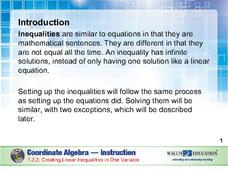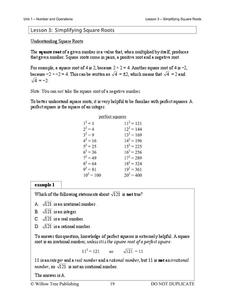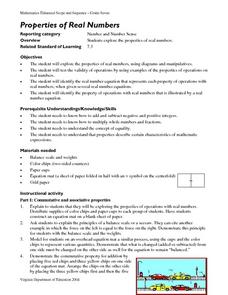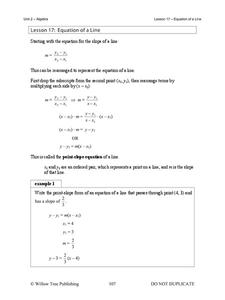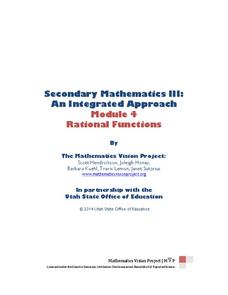EngageNY
Polynomial, Rational, and Radical Relationships
This assessment pair goes way beyond simple graphing, factoring and solving polynomial equations, really forcing learners to investigate the math ideas behind the calculations. Short and to-the-point questions build on one another,...
Benjamin Franklin High School
Saxon Math: Algebra 2 (Section 1)
This first of twelve algebra 2 resources provides a broad review of many algebra 1 concepts through a number of separable lessons and labs. Starting with the real number system and its subsystems, the sections quickly but thoroughly...
Charleston School District
Identifying Irrational Numbers
These numbers have some personality! Are they rational or irrational? The lesson examines the definitions of rational and irrational numbers and shows examples of how to identify them.
EngageNY
Multiplication of Numbers in Exponential Form
Develop a solid understanding of multiplication and division properties of exponents. Individuals expand exponential terms to discover the patterns and create the properties in the second installment in a series of 15. The activity...
Curated OER
Cutting Corners - Parts 1 and 2
Learners use optimization concepts to design their own container. For this optimization lesson plan, students understand how the optimization concept is critical in calculus and why products are packaged the way they are.
BW Walch
Creating Linear Inequalities in One Variable
Just when a young mathematician starts to feel comfortable turning word problems into linear equations, shake things up and throw inequalities in the mix. This excellent, instructive presentation takes the steps for solving an...
Willow Tree
Simplifying Square Roots
The square root of five and five do not have the same value! How many times have you addressed this with math classes? A lesson gives an explanation of a square root and gives examples for simplifying square root...
Willow Tree
Factoring
Build an understanding of factors and use it to write the prime factorization of numbers. After exploring key vocabulary, learners create prime factorization for given numbers. They then use the prime factorizations to determine the...
PBS
Patterns to the Rescue!
Track down the Cyberchase episode that this lesson is associated with. Using a worksheet that is embedded in the plan, learners must find the next two numbers and shapes (a double pattern). Once these have been discovered, pupils try...
Curated OER
The Golden Students
Scholars view the video, "Donald Duck in Mathmagic Land," and discuss examples in nature which have proportions of the golden ratio. They measure and record different body lengths from a worksheet and convert the ratios to equivalent...
Curated OER
Solving Inequalities and Graphing on a Number Line
Students review solving equations. They solve an inequality and discuss how to graph it. Students work together on one inequality and then graph two on their own. This lesson contains links to a PowerPoint and a worksheet.
Virginia Department of Education
Properties of Real Numbers
Students use paper cups and colored chips to observe properties of operations with real numbers. As a class, students brainstorm and use manipulatives to demonstrate associative, commutative, distributive identity and inverse properties....
Curated OER
Simple Inequalities
Students solve inequalities. In this inequalities lesson, students evaluate simple inequalities. They examine vocabulary words. Students participate in breath holding activities and write inequalities to represent the activity. In teams,...
Curated OER
What's Next?
Teach the class how to continue a given number pattern, and have them state a rule to explain their answer. Arithmetic sequences and related worksheets are used to reinforce the concept of numerical patterns using the nthterm.
Curated OER
Solving Linear Inequalities
Walk the class through the steps of how to evaluate linear inequalities in one variable and graph the solution set. Define and discuss key vocabulary terms, then have individuals work problems of varying difficulty. Included are word...
West Contra Costa Unified School District
Connecting Fractions and Rational Expressions
Teach class members to work with rational expressions using their knowledge of fractions. The lesson plan starts with a warm-up of rational expressions at four different levels of complexity. The different levels continue throughout...
Willow Tree
Equations of a Line
Each form of a linear equation has its purpose — pupils just have to find it. Building on the previous lesson in the series, learners examine point-slope and standard form. Using point-slope form, pupils write the equation of a...
West Contra Costa Unified School District
Solving Inequalities
What does translating points on a number line have to do with solving inequalities? Young mathematicians first learn about translations of points on a number line, and then use this information to solve linear inequalities in one variable.
Mathematics Vision Project
Module 4: Rational Functions
Time to study the most sensible function — rational functions! The seven-lesson unit develops the concept of a rational function through a connection to rational numbers and fractions. Scholars graph functions, solve equations, and...
5280 Math
Capture the Points
Play a game of capture the points. Young scholars receive a number line with specific points graphed and must write an inequality that captures all the points. The second task of the algebra project is to write an inequality with...
Curated OER
Factoring Trinomials
Students factor trinomials and quadratics. In this algebra instructional activity, students solve quadratics when the leading coefficient is one. They use a special factoring pattern to solve the trinomial.
Curated OER
To Quote or Not to Quote
Introduce your middle and high schoolers to the correct use of quotation marks. They identify examples of correct and incorrect quotations in magazines and edit a paragraph in groups. Use this instructional activity as a way to reinforce...
Curated OER
Extreme Elevations
Seventh graders use highest and lowest points of land elevation around the world to find the differences. Sea level is zero, so students be operating with positive and negative numbers. After students find the information on the...







